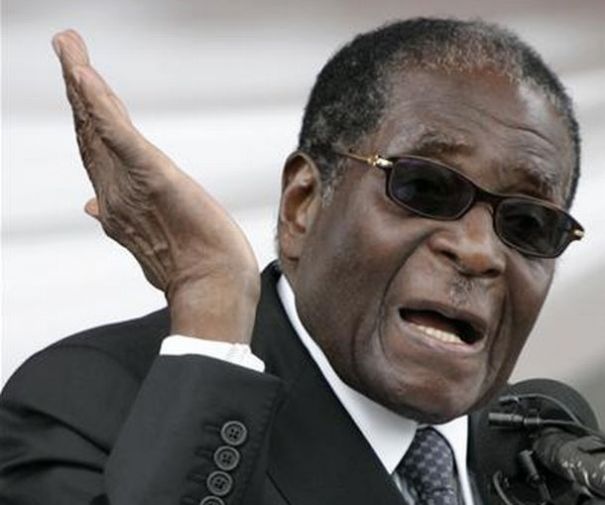Can President Mugabe address US Congress?

Obi Egbuna Jr Simunye
For those who study President Mugabe’s speeches, we have become accustomed to him saving his best points for the end of his remarks.
We are only a few months away from Israeli Prime Minister Benjamin Nethanyahu staging a diplomatic act of defiance, by coming to the US and addressing Congress against the wishes of President Obama.
As President Obama is scheduled to arrive in Kenya for the Global Entrepreneur Summit which is recognised as his brainchild, that stems from his speech in Cairo, Egypt six years ago entitled “A New Beginning”, the children of Africa are in a position to pose a crucial question.
Since Prime Minister Nethanyahu has addressed the US Congress on three separate occasions, can President Mugabe be afforded that opportunity just once?
Because for all intents and purposes, the Zionist State of Israel, not Washington DC, behaves like the real capital of the United States, it comes as no surprise that Prime Minister Nethanyahu diplomatically bulldozed his way into Washington, showing absolutely no regard for President Obama whatsoever.
The irony of this soap opera was the Congressional Black Caucus skipped the meeting, not because they object to how Zionist Israel slaughters our Palestinian sisters and brothers, but to stroke President Obama’s larger than life but at times rather fragile ego.
Based on accounts from Western imperialist media sources CBC member, Congressman Gregory Meeks was one of the ringleaders of the boycott. Mr Meeks is quoted as saying; “To me it is somewhat of an insult to the President of the US . . . Barack Obama is my President. He’s the nation’s President and it is clear therefore I’m not going to be there as a result of that, not as a result of the good people of Israel”. Africa has always marvelled at not only President Mugabe’s sense of history, but his incredible memory and ability to make crucial events surrounding the revolutionary process in Zimbabwe relevant to the youth at home and abroad.
We remember the empty promises Congressman Meeks never delivered on when he visited President Mugabe in Zimbabwe, when the inclusive Government was in full swing. The truth is Congressman Meeks was in Zimbabwe to carefully examine how much support former Zimbabwe Prime Minister Morgan Tsvangirai needed, in his quest to become Zimbabwe’s next president. This was after all a man the President Obama referred to as his partner on the ground in Zimbabwe. What Congressman Meeks failed to reveal to the Zimbabweans is he serves on the board of the National Endowment for Democracy, which not only finances 14 civil society groups in Zimbabwe, but was created after former US President Ronald Reagan’s term.
When President Reagan addressed British parliament in the early 80’s, he stated that a think tank like NED was necessary for US-EU imperialism to win the Cold War.
In September 2009, while President Mugabe was in New York for the UN General Assembly, he was visited by Congressman Meeks and Congressman Danny Davis of Illinois. That meeting occurred three weeks after Congressman Meeks visited Zimbabwe and failed to meet President Mugabe. The reason Congressman Meeks provided was that this was due to his flight schedule.
During this encounter, both Congressman Meeks and Davis told President Mugabe they tried to arrange for him to speak at the Congressional Black Caucus annual meeting. Due to the travel measures that prohibit President Mugabe from traveling anywhere 25 kilometres from New York City, this was obviously small talk on the part of both Congressman Meeks and Davis.
What Zimbabweans in particular and Africans as whole have yet to receive is an explanation from the CBC, concerning not only why they came five votes short of unanimously voting in favour of the Zimbabwe Democracy and Economic Recovery Act of 2001, but the reason why a single member refused to vote against zidera. If Africa’s children push the envelope, an immediate answer is the late pro-Zionist Congressman Tom Lantos, whose claim to fame was that he had the distinction of being the only holocaust survivor to serve in the US Congress.
In 2007, as the chair of the US House Foreign Affairs Committee Congressman, Lantos raised the Zimbabwe question on the floor and referred to President Mugabe and zanu-pf’s leadership as tyranic. This resolution was endorsed by several CBC members — Donald Payne, Alcee Hastings, Bobby Rush, William Jefferson, Jesse Jackson Jr, Chaka Fattah and Sheila Jackson Lee. The same resolution was introduced in the US Senate simultaneously by none other than President Obama when he represented the State of Illinois in that capacity.
As a Zionist with a liberal leaning, the hatred Congressman Lantos had for President Mugabe and zanu-pf is perfectly understood. When we study every entity of the Western imperialist camp, it would be hard to argue that the Zionists keep all of the Palestinians’ most ardent supporters under an intense microscope.
Whenever President Mugabe crossed Congressman Lantos’ mind, these words rang in his ears;
“Considering that the racist regime in occupied Palestine and the racist regimes in Zimbabwe and South Africa have a common imperialist origin, forming a whole and having the same racist structure and being organically linked aimed at repression of the dignity and integrity of the human being.”
These powerful words come from the document AHG/RES 77 from the OAU Heads of State and Government’s 12th Ordinary Session in Kampala, Uganda in 1975, from a resolution on the Question of Palestine.
As the world watched Prime Minister Netanyahu serenade the US Congress, many overlooked his gratitude to President Obama for all he had done to defend Israel. The highlights were President Obama’s support for missile interceptors during a clash with Hamas, and opposing anti-Israeli resolutions at the UN.
In the case of Prime Minister Netanyahu, his speech to Congress was predictable to say the least. On the other hand, if President Mugabe was granted this platform, the element of surprise would serve as invaluable weapon.
Because US-EU imperialism has always played up the differences between President Mugabe and Nelson Mandela, it would be extremely strategic if President Mugabe began by raising the issue why the US portrayed Madiba as a saint like figure, but at the same time kept him on their list of terrorists until 2008. This was coincidentally the same year during his birthday celebration that Madiba stated there was absence of strategic leadership in Zimbabwe.
Since President Mugabe is recognised as the international spokesperson for land reclamation and land rights, on the halls of the US Congress, the President could lend his voice to the cause of his brother and Comrade President Evo Morales of the Republic of Bolivia, who has challenged US imperialism’s obsession with waging environmental warfare against Bolivia and Peru. While it has been documented that the Bolivians and Peruvians use the Coca plant to rid their nations of arthritis, malaria, ulcers and asthma, the imperialists are seeking to eradicate and fumigate these crops. It is US imperialism who used crack cocaine to maintain their wars in the contras.
Many of the human rights watchdogs and NGOS and members of Congress have accused Zimbabwe’s police of violence and torture. We are sure President Mugabe would raise how a country where so-called African-Americans are murdered by law enforcement every 28 hours could point a finger at any other nation on earth.
Another compelling attribute of President Mugabe’s makeup is his willingness to forgive. The decision to pardon former Rhodesian Prime Minister Ian Smith and his cohorts of crimes against humanity is not an isolated incident.
During his engagement with Congressman Meeks and Davis, President Mugabe never once chastised them for being willing culprits in US-EU imperialism’s regime change agenda concerning Zimbabwe. After letting Congressman Meeks and Davis ramble on for nearly 45 minutes, President Mugabe posed a simple question to both gentlemen, since both of them voted in favour of US-EU sanctions on Zimbabwe — how would they approach the Zimbabwe question strategically moving forward?
For those who study President Mugabe’s speeches, we have become accustomed to him saving his best points for the end of his remarks. The chance to address the US Congress would grant him an opportunity to tell the world, while Zimbabwe and Cuba have embassies in Washington maintaining US-EU sanctions on Zimbabwe and the US blockade on Cuba have no place in the world that’s to come.
Obi Egbuna Jr is the US Correspondent to The Herald and a US-based member of the Zimbabwe Cuba Friendship Association. His email is [email protected]










Comments